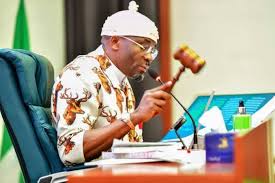Uncategorized
Ahmed Idris Wase: Stewardship of a people oriented Deputy Speaker

As the National Assembly commemorates it one year in office, it is also not out of place to beam a search light on the number 2nd man of the House of Representatives, Mr Ahmed Idris Wase to ascertain how well he has represented his constituents and indeed Nigerians.
The Deputy Speaker of the House of Representatives was elected into the lower Chamber of the National Assembly in 2007 and is currently serving his fourth term. He represents Wase Federal Constituency of Plateau State on the platform of APC.

Wase chaired the House of Representatives Committee on Federal Character in the seventh and eighth assembly respectively. The Committee under his leadership was considered one of the House most active Committees.
Ahmed Wase has demonstrated to his constituents that good governance and quality representation is possible hence the positive impact to the masses, giving priority to Education, Electricity, Health, Good Road and water as his legislative interest. He is also an advocate of youth development hence why he has offered a lot of Students Scholarships. He has also built several Skills Acquisition Centres to empower both women and youths. His position and influence has attracted several federal government projects to his States.
Hence the fundamental duty of a legislature is to make laws for the good governance of the country and the Deputy speaker has demonstrated this through the quality of bills sponsored within one year.
A bill seeking to impose stiffer sanction on the breach of the provisions of the Currency Conversion (Freezing Orders) Act Cap. C43 Laws of the Federation of Nigeria, 2004 Act has been gazetted for Second Reading on the floor of House of Representatives on resumption from the annual recess.
The Deputy Speaker, Wase, seeks to “give discretionary powers to the Judge of a High Court, to order forfeiture of assets of affected person; and for related matters.
The bill seeks to amend Section 9 (1) of the Principal Act by substitution for the phrase the President may in his discretion direct that in line 2, the phrase, the judge of a High Court may after hearing the parties direct that.
It also seeks to expunge Section 9(2) of the Principal Act.
According to the Explanatory Memorandum of the bill, the proposed legislation seeks to amend the Currency Conversion (Freezing Orders) Act Cap. C43 Laws of the Federation of Nigeria, 2004 to give discretionary powers to the Judge of a High Court, to order forfeiture of assets of affected person.
Other bills sponsored by the Deputy Speaker that have been gazetted for second reading include: ‘Public Accounts Implementation Tribunal (Amendment) bill, Federal Commissions (Privileges & Immunities) amendment bill, Miscelleneous Offences Act (Repeal) bill, National Institute for Sports Act (Establishment) bill and Federal University of Agriculture, Wase (Establishment) bill.
Four other bills sponsored by Wase that are currently referred to the Committee of the Whole are: National Housing Fund (Establishment) bill, Nigeria Football Association bill, National Sports Commission bill and Federal Mortgage Bank of Nigeria (Establishment) bill, while the Federal University Gashua bill has been assented to by President Muhammadu Buhari.
In the same vein, the House is also expected to commence debate on the general principles of a bill which seeks to amend the Federal Character Commission (Establishment etc) Act Cap. F7 Laws of the Federation of Nigeria, 2004 by giving the Commission additional powers to enable it discharge its functions more effectively; and for related matters.
The bill which is also sponsored by Mr Ahmed Idris specifically seeks to amend Sections 2, 3, 4, 5, 7, 9, 11, 13 and 15 of the Principal Act.
As proposed by the Deputy Speaker, the bill seeks to amend the provisions of Section 2 by amending subsection 1a, by inserting the words and accounting officer immediately after the word Executive.
It also seeks to amend Section 4(1a), by substituting for the word President in line 1 the words National Assembly or the State House of Assembly, as the case may be, in subsection (2), by inserting immediately after the existing paragraph (j) a new paragraph (k) to enforce the federal character guidelines and formulae in any company in which the Federal, State or Local Governments has at least 40% shareholding interest.”
The proponent of the bill also seeks to provide a new subsections (5 and 7 which provides that: “The approval required to be made by the National or State House of Assembly, as the case may be, under this section and elsewhere in this Bill shall be by a simple majority vote of the members of the Senate and House of Representatives or State House of Assembly present and voting in their respective chambers.
In exercising its powers under section 4(1) (a) of this Act, the Commission shall have regard for the need to ensure gender equity and the need for fair representation of the physically challenged person.
For the purposes of section 4(1d & i) of this Act, the annual budgetary proposals by any Ministry, Extra-Ministerial Department or agency for the provision of socio-economic services, amenities and infrastructural facilities shall be made in consultation with the Commission.
Wase also proposed the amendment of Section 5(1) by inserting immediately after the existing paragraph (c) a new paragraph (cc) suspend, cancel or set aside any recruitment exercise, process or distribution of amenities being carried out by any Ministry, Extra-Ministerial Department, agency or any company in which the government has 40% shareholding interest where such recruitment was conducted in a manner inconsistent or in contravention with any guideline or formula worked out by the Commission and approved by the National or State House of Assembly.
The bill also seeks to empower the Commission to institute investigations, summon and to interrogate any officer of the institution or organization connected with the subject matter of the investigation.
He also proposed amendment to Section 15(1, 2), by substituting N50,000 to N250,000; and increase the initial N100,000 to N2,500,000.
The bill also seeks to amend section 16A which provides that: Notwithstanding the provisions of sections 14 and 15, the Commission may seek for an order of injunction, mandamus, certiorari, or prohibition from any High Court to enforce compliance with any guideline and formula, directive, circular or instruction issued by it under this Act.
Lizzy Chirkpi, a journalist writes from Abuja























